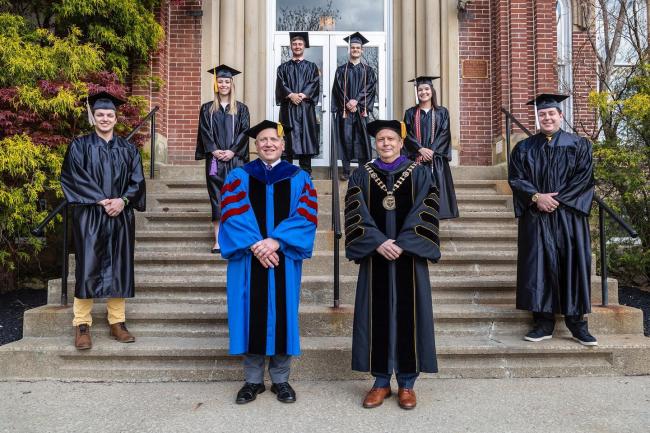The Waynesburg University Writing Center and the Eberly Library teamed up to present an evening celebrating Banned Books Week on October 8. Thank you to the student book club for the decorations and to the theater students, discussion leaders, and participants who made the Banned Books Week Celebration possible. In the beautiful Skylight room in Eberly library, after hearing banned book excerpts read by theater students, Aubrey Lesnett delivered her award-winning speech, defending a book that currently does not exist-- although we encourage someone to take up the task of developing it! In the dystopian world where Waynesburg University would attempt to ban such a book, Aubrey defends a book that includes voices that challenge authority, pose moral dilemmas, and demand courage. Enjoy reading a transcript of her speech below. Congratulations again, Aubrey!
Benjamin Franklin once said, “If all printers were determined not to print anything till they were sure it would offend nobody, there would be very little printed.”
I want you to picture your favorite book. It may be one you read as a child, or it may be the latest one you read with your book club, or really anything in between. How would you feel if someone took away the access that you had to that book, affecting not only you, but future generations that may not be able to read that book now? That is sadly a reality for some people. Even though you can still access banned books and they're not really gone, banning a book almost creates a sort of stigmatism around the book, which may steer people away from wanting to read it.
This has become a reality to some people, and I’m standing here today because mine may become one of them. My favorite book, “Whispers Between the Stars,” is next on the chopping block. In this book, seventeen-year-old Lira Calen can hear the mysterious Starstream-- whispers that carry secrets of lost worlds and looming dangers. When a hidden star map falls into her hands, she’s thrust into a perilous journey across uncharted galaxies. With unlikely allies at her side, Lira must decide whether the voices guiding her are offering salvation or leading her into the dark.
This book has many themes hidden within it, such as destiny vs. choice, coming of age, and hope in the unknown. Not only have I found comfort in this book, but so have other readers who read the book when they were my age. This book helped to shape a whole generation by showing us that it’s okay to have hope in things when you’re not quite sure how things are going to work out.
Even though this book is a fun read, it’s also an educational one. It encourages critical thinking, imagination and creativity, and ethics and responsibility. The book pushes readers to look beyond the surface of what they are told and to question the reliability of information. Lira hears voices in the Starstream that contradict official records and challenge what people believe about history, power, and the universe. This forces her, and the reader, to ask: Who decides what truth is? Why might someone hide or distort it? The novel invites readers to picture vast galaxies, strange civilizations, and the mysterious Starstream, a concept that blurs the line between science and the mystical. By entering Lira’s world, readers are encouraged to stretch their imaginations beyond the boundaries of Earth and envision what life, communication, and survival might look like in entirely new contexts.
The story doesn’t just revolve around adventure—it constantly asks hard questions about what it means to do the right thing when knowledge and power are at stake. Lira’s ability to hear the Starstream makes her a target for people who want to control or exploit her gift. Throughout the novel, she faces ethical dilemmas: Should she share what she learns if it could cause panic? Should dangerous truths be kept secret, or does everyone have a right to know?
People want to ban “Whispers Between the Stars” for several reasons, and it’s all because of the way they interpret its content. The book questions whether leaders and institutions always tell the truth, which could be seen as encouraging rebellion or distrust in authority figures. Since the story deals with suppressed knowledge and hidden voices, some might see it as a critique of censorship itself, making it controversial in settings that fear open discussion. Lira’s defiance, independence, and leadership could clash with groups uncomfortable with strong female protagonists who question societal norms.
“Whispers Between the Stars” is more than just a story about galaxies and whispers—it is a reminder of the power of truth, imagination, and courage. To ban it would be to silence a book that encourages readers to think critically, dream boldly, and wrestle with questions of responsibility and justice. If we remove stories like this from our shelves, we don’t just lose a novel—we lose opportunities for growth, discussion, and inspiration. Let the whispers remain between the stars but also here, in our library, where every voice deserves to be heard.


